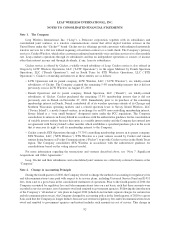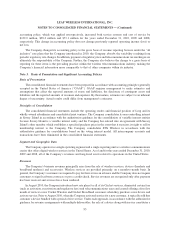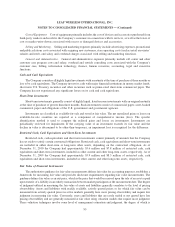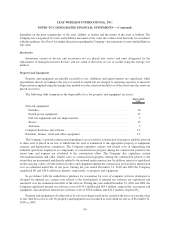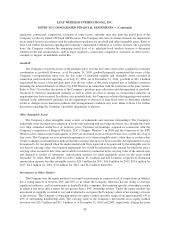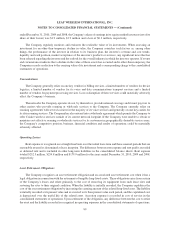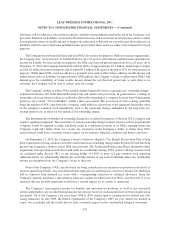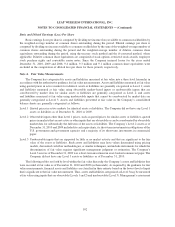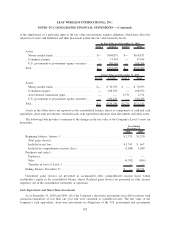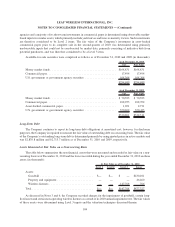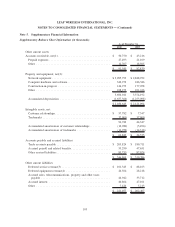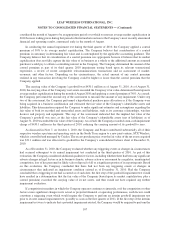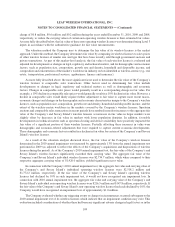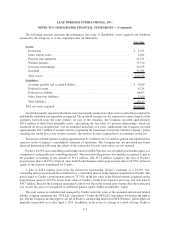Cricket Wireless 2010 Annual Report Download - page 107
Download and view the complete annual report
Please find page 107 of the 2010 Cricket Wireless annual report below. You can navigate through the pages in the report by either clicking on the pages listed below, or by using the keyword search tool below to find specific information within the annual report.allowance will be reduced or released in its entirety, with the corresponding benefit reflected in the Company’s tax
provision. Deferred tax liabilities associated with wireless licenses and investments in certain joint ventures cannot
be considered a source of taxable income to support the realization of deferred tax assets because these deferred tax
liabilities will not reverse until some indefinite future period when these assets are either sold or impaired for book
purposes.
The Company has substantial federal and state NOLs for income tax purposes. Subject to certain requirements,
the Company may “carry forward” its federal NOLs for up to 20 years to offset future taxable income and reduce its
income tax liability. For state income tax purposes, the NOL carryforward period ranges from five to 20 years. As of
December 31, 2010, the Company had federal and state NOLs of approximately $2.1 billion, which begin to expire
in 2022 for federal income tax purposes and of which $0.3 million will expire at the end of 2011 for state income tax
purposes. While these NOL carryforwards have a potential to be used to offset future ordinary taxable income and
reduce future cash tax liabilities by approximately $800 million, the Company’s ability to utilize these NOLs will
depend upon the availability of future taxable income during the carryforward period and, as such, there is no
assurance the Company will be able to realize such tax savings.
The Company’s ability to utilize NOLs could be further limited if it were to experience an “ownership change,”
as defined in Section 382 of the Internal Revenue Code and similar state provisions. In general terms, a change in
ownership can occur whenever there is a collective shift in the ownership of a company by more than 50 percentage
points by one or more “5% stockholders” within a three-year period. The occurrence of such a change generally
limits the amount of NOL carryforwards a company could utilize in a given year to the aggregate fair market value
of the company’s common stock immediately prior to the ownership change, multiplied by the long-term tax-
exempt interest rate in effect for the month of the ownership change.
The determination of whether an ownership change has occurred for purposes of Section 382 is complex and
requires significant judgment. The occurrence of such an ownership change would accelerate cash tax payments the
Company would be required to make and likely result in a substantial portion of its NOLs expiring before the
Company could fully utilize them. As a result, any restriction on the Company’s ability to utilize these NOL
carryforwards could have a material adverse impact on its business, financial condition and future cash flows.
On September 13, 2010, the Company’s board of directors adopted a Tax Benefit Preservation Plan to help
deter acquisitions of Leap common stock that could result in an ownership change under Section 382 and thus help
preserve the Company’s ability to use its NOL carryforwards. The Tax Benefit Preservation Plan is designed to deter
acquisitions of Leap common stock that would result in a stockholder owning 4.99% or more of Leap common stock
(as calculated under Section 382), or any existing holder of 4.99% or more of Leap common stock acquiring
additional shares, by substantially diluting the ownership interest of any such stockholder unless the stockholder
obtains an exemption from the Company’s board of directors.
None of the Company’s NOL carryforwards are being considered as an uncertain tax position or disclosed as
an unrecognized tax benefit. Any carryforwards that expire prior to utilization as a result of a Section 382 limitation
will be removed from deferred tax assets with a corresponding reduction to valuation allowance. Since the
Company currently maintains a full valuation allowance against its federal and state NOL carryforwards, it is not
expected that any possible limitation would have a current impact on its results of operations.
The Company’s unrecognized income tax benefits and uncertain tax positions, as well as any associated
interest and penalties, are recorded through income tax expense; however, such amounts have not been significant in
any period. All of the Company’s tax years from 1998 to 2010 remain open to examination by federal and state
taxing authorities. In July 2009, the federal examination of the Company’s 2005 tax year, which was limited in
scope, was concluded and the results did not have a material impact on the consolidated financial statements.
101
LEAP WIRELESS INTERNATIONAL, INC.
NOTES TO CONSOLIDATED FINANCIAL STATEMENTS — (Continued)



